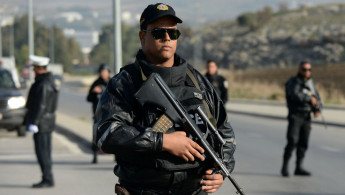Islamic State group claim deadly attack on Tunisian police
The Islamic State group said it was responsible for the attack on Tunisian police that left three policemen dead and 12 injured in central Tunisia.
2 min read
Three Tunisian policemen were killed in the clashes [Getty]
The Islamic State group (IS) on Tuesday claimed responsibility for an attack in central Tunisia that killed three policemen and wounded 12.
In a statement posted on Twitter, IS said the attack in the Sidi Bouzid region was carried out by "two soldiers of the caliphate who attacked two military sites with small arms."
A fourth policeman was killed in a separate attack.
"The national guard attempted to ambush at dawn two terrorists on a motorcycle in Sidi Ali Ben Aoun after obtaining information that (they) were about to launch an operation," ministry spokesman Mohamed Ali Aroui told AFP.
He said two officers were killed in the ensuing shoot-out, and that the militants fled before killing a third policeman who was making his way to work at the time.
They were pursued by an elite unit of the national guard, Aroui said.
"One of the terrorists was exterminated, the second was wounded and arrested. He is in a serious condition," he added.
Twelve people were wounded, including three members of the security forces, a soldier and eight bystanders, an official at the nearby Sidi Bouzid hospital told AFP.
One civilian was in a critical condition, the official added.
Laying the blame
Before the IS claimed responsibility, the interior ministry had blamed the violence on Tunisia's main jihadist group, the al-Qaeda-linked Okba Ibn Nafaa Brigades, which it has accused of being behind several recent attacks.
"The two terrorists... belong to Okba Ibn Nafaa," Aroui said, although he did not identify them.
Authorities have blamed the group for a series of attacks, including the March massacre at the Bardo National Museum in Tunis that killed 21 foreign tourists and a policeman although the Islamic State group had claimed responsibility for the museum killings.
Tunisia has seen a surge in radical Islam since veteran president Zine El Abidine Ben Ali was ousted in the 2011 revolution. The country faced scattered extremist violence, and a disproportionately large number of Tunisians have joined Islamic State fighters in Syria and Iraq.
Tunisia's president in March promised to wage a "merciless war against terrorism" after gunmen killed 18 foreign tourists and two Tunisians in a daylight attack on the National Bardo Museum in the capital.
In a statement posted on Twitter, IS said the attack in the Sidi Bouzid region was carried out by "two soldiers of the caliphate who attacked two military sites with small arms."
A fourth policeman was killed in a separate attack.
"The national guard attempted to ambush at dawn two terrorists on a motorcycle in Sidi Ali Ben Aoun after obtaining information that (they) were about to launch an operation," ministry spokesman Mohamed Ali Aroui told AFP.
| One of the terrorists was exterminated, the second was wounded and arrested. He is in a serious condition. - Interior Ministry spokesman |
They were pursued by an elite unit of the national guard, Aroui said.
"One of the terrorists was exterminated, the second was wounded and arrested. He is in a serious condition," he added.
Twelve people were wounded, including three members of the security forces, a soldier and eight bystanders, an official at the nearby Sidi Bouzid hospital told AFP.
One civilian was in a critical condition, the official added.
Laying the blame
Before the IS claimed responsibility, the interior ministry had blamed the violence on Tunisia's main jihadist group, the al-Qaeda-linked Okba Ibn Nafaa Brigades, which it has accused of being behind several recent attacks.
"The two terrorists... belong to Okba Ibn Nafaa," Aroui said, although he did not identify them.
Authorities have blamed the group for a series of attacks, including the March massacre at the Bardo National Museum in Tunis that killed 21 foreign tourists and a policeman although the Islamic State group had claimed responsibility for the museum killings.
Tunisia has seen a surge in radical Islam since veteran president Zine El Abidine Ben Ali was ousted in the 2011 revolution. The country faced scattered extremist violence, and a disproportionately large number of Tunisians have joined Islamic State fighters in Syria and Iraq.
Tunisia's president in March promised to wage a "merciless war against terrorism" after gunmen killed 18 foreign tourists and two Tunisians in a daylight attack on the National Bardo Museum in the capital.





 Follow the Middle East's top stories in English at The New Arab on Google News
Follow the Middle East's top stories in English at The New Arab on Google News
![22 Arab countries at COP29 have rejected the targeting of fossil fuels [Getty]](/sites/default/files/styles/image_330x185/public/2024-11/GettyImages-2184289638.jpg?h=199d8c1f&itok=ptHl5bec)
![Dozens of people turned out for the funerals [Getty]](/sites/default/files/styles/image_330x185/public/2024-11/GettyImages-2185229760.jpg?h=e7c891e8&itok=1bctDcE6)
![The UAE is widely suspected of arming the RSF militia [Getty]](/sites/default/files/styles/image_330x185/public/2024-11/GettyImages-472529908.jpg?h=69f2b9d0&itok=Yauw3YTG)